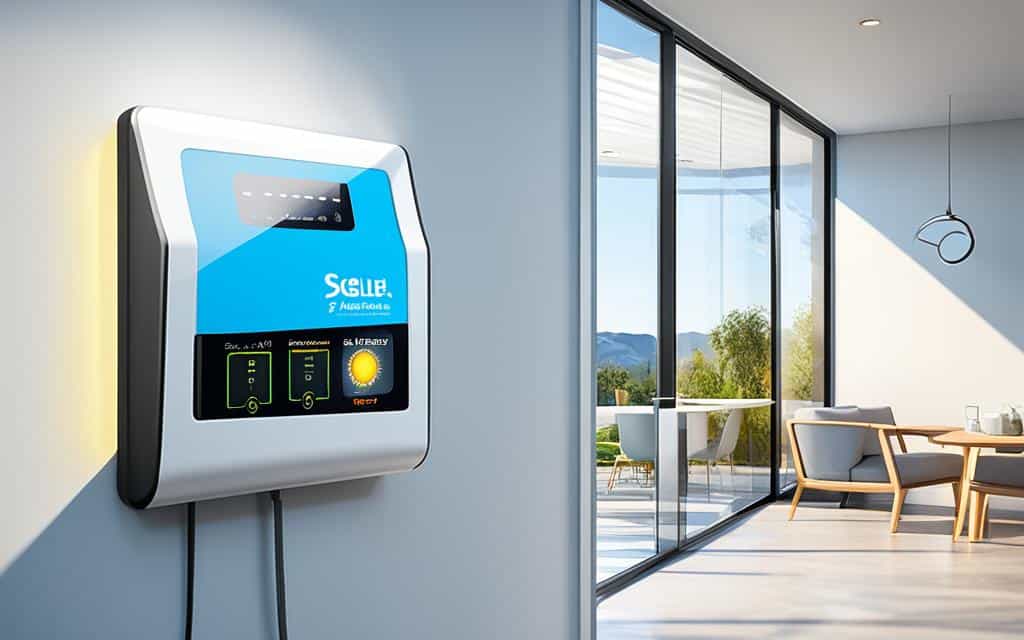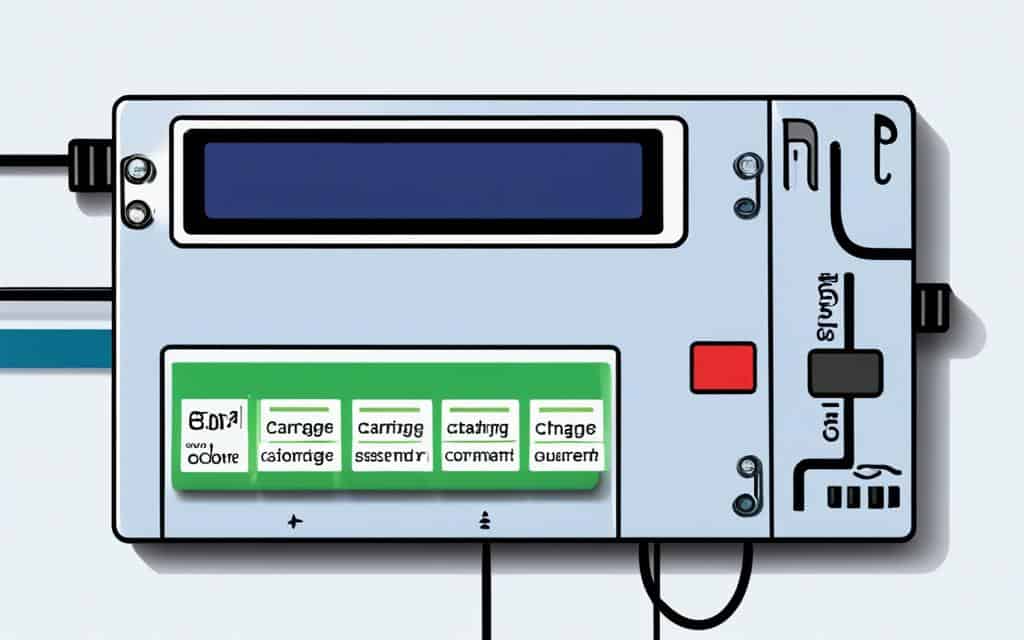Do You Need a Charge Controller for Solar Panels?
A charge controller is essential for solar panels to regulate voltage and prevent battery overcharging, maximizing system efficiency and longevity.

Did you know that 80% of residential solar systems in India use charge controllers? These devices are key to making sure solar panels work well for a long time. They keep the battery in good condition and protect your solar investment. For anyone looking to go solar, understanding the role of a charge controller is vital.
If you hook a solar panel directly to a battery, it could be bad news. Without a control device, the battery might get too much voltage and current. A solar charge controller, or solar regulator, does three main things. It makes sure the battery gets the right voltage, manages the charge going in, and stops overcharging.
Fenice Energy has more than 20 years of experience in providing solar and clean energy solutions. They offer help with everything from solar to backup systems and EV charging. Their team of experts can guide you on the best charge controller for your solar setup, making sure it runs safely and efficiently.
Key Takeaways
- A solar charge controller is necessary to protect your batteries from damage due to excessive voltage and current from solar panels.
- Charge controllers regulate the charging process, ensuring your batteries are charged safely and efficiently.
- Charge controllers provide important electrical protection features, such as disconnecting the battery when it reaches a critically low voltage.
- The two main types of charge controllers are PWM and MPPT, each with its own advantages depending on your solar system’s requirements.
- Fenice Energy’s experts can help you choose the right charge controller for your solar setup, optimizing performance and safeguarding your investment.
What is a Solar Charge Controller?
A solar charge controller is key in solar systems with batteries. It manages voltage and current from panels. This ensures batteries get the right input, protecting them. The charge controller boosts the system’s performance and lifespan.
Functions of a Charge Controller
Solar panels give out different amounts of power, like when the sun is brighter. The charge controller makes sure the battery charges well and safely. It does this by carefully regulating the power input.
Regulating Battery Charge
The controller sees to it that the battery gets just the power it needs to stay healthy. It stops overcharging or undercharging. This stops the battery from getting damaged.
Electrical Protection Features
Charge controllers offer vital protection features for the electrical system, such as:
- Disconnecting the battery at a very low voltage to avoid damage
- Stopping current from moving back to the solar panels with no sunlight
- Changing the charge based on battery temperature to prevent damage
These protections are critical for both the battery and the whole solar system’s life.
Types of Solar Charge Controllers
In terms of solar charge controllers, you’ll mostly see two types: PWM and MPPT. These are known for how they manage solar power. Each type has its strengths, good for different solar set-ups and needs.
PWM Charge Controllers
PWM charge controllers are the simpler, budget-friendly choice. They connect the solar panel right to the battery. They control the charge by changing how often the current is sent. This method is best for smaller solar projects, but it’s not as effective as MPPT controllers.
MPPT Charge Controllers
MPPT charge controllers are praised for their performance and technology. They use a special converter to always find the best solar panel power. By adjusting the power flow, they make sure the battery gets as much power as possible. They work well with various solar systems, offering more energy for bigger projects.
When deciding on a charge controller, think about your solar set-up’s size and power needs. Fenice Energy can help you choose the right PWM or MPPT controller. They offer both and expert advice for your system.
When Do You Need a Charge Controller?
A solar charge controller is key in some solar setups. It makes sure batteries charge the right way and safely. It’s needed for off-grid solar and grid-tied setups without battery storage.
Off-Grid Solar Systems
In off-grid systems, panels aren’t linked to the grid. Thus, a charge controller is a must. It controls the flow of solar power to batteries. This stops overcharging and keeps batteries healthy. Such systems need this to work well and last long.
Grid-Tied Systems Without Batteries
Even in systems tied to the grid without batteries, a controller is useful. It makes sure solar panels don’t send too much power. This prevents damage to system parts. So, it helps the whole system run better and last longer.
| Scenario | Charge Controller Necessity |
|---|---|
| Off-Grid Solar Systems | Necessary to regulate battery charging and prevent damage |
| Grid-Tied Systems Without Batteries | Beneficial to manage voltage and current, optimize performance, and protect electrical components |
To sum it up, a charge controller is a must for some solar setups. It’s great for off-grid systems and still helpful in the grid-tied ones. Fenice Energy gives top-notch solar and clean energy solutions. We have over 20 years in the business.
do you need a charge controller for solar panels
A solar charge controller is key for systems that store energy in batteries. It helps manage the energy flow from solar panels to batteries. This keeps the batteries safe and charges them well.
Factors Affecting Charge Controller Requirement
Your system’s size and setup decide if you need a charge controller. Things like panel capacity, the battery type, and the overall system power matter. They help figure out if a charge controller is needed.
For tiny systems, like those that power just a few lights, a controller might not be needed. But, for most home and off-grid systems with battery storage, a controller is crucial. It keeps the batteries safe and helps the system work its best.
Battery Types and Charging Methods
The batteries and how they need to be charged are big factors too. Lead-acid, lithium-ion, or nickel-cadmium batteries have different needs for good charging. So, which battery chemistry your system uses matters for the controller’s need.
| Battery Type | Charging Requirements | Charge Controller Necessity |
|---|---|---|
| Lead-Acid | Require precise voltage and current regulation to prevent overcharging and damage | Highly recommended |
| Lithium-Ion | Require a specialized charging algorithm to ensure safe and optimal charging | Necessary |
| Nickel-Cadmium | Require a trickle-charging method to maintain optimal charge levels | Recommended |
In short, a solar charge controller is critical for systems with battery storage. It safely and effectively charges the batteries, which is vital for the system’s life and its performance.
The need for a charge controller depends on your system’s size, battery type, and more. Each system is unique, but most need a controller to work well.

Choosing the Right Charge Controller
Looking for the right solar charge controller is important. You need to look at several things to make sure it works well with your system. Firstly, consider the voltage and current needs of your solar panels and batteries.
Voltage and Current Ratings
Start by figuring out how much voltage and current your system needs. The controller should match your system’s highest voltage and current. A good rule is to pick a controller with higher ratings. Go for 15-20% more in voltage and 25-30% more in current than your system’s needs. This extra capacity keeps your system safe from overloads.
Battery Compatibility
The charge controller needs to match your battery type, be it lead-acid, lithium-ion, or another kind. Each battery type has its own way of charging safely and efficiently. Our controllers at Fenice Energy are built to be versatile. They work well with various battery types, suiting your solar system’s needs.
Control Set Points and Temperature Compensation
Modern charge controllers come with smart features. You can adjust the charging set points and use temperature compensation. This fine-tunes the charging to best fit your battery and the weather. It helps your batteries last longer and stay safe from over or under-charging. At Fenice Energy, our charge controllers have advanced features for the best performance.
Additional Features and Considerations
Advanced solar charge controllers do more than just regulate battery charging. They offer extra features to boost your solar system’s performance.
LCD Displays and Monitoring
Some controllers have LCD displays. These show live info like battery voltage and state of charge. This makes it easy to see how your system is doing and make any necessary tweaks.
Moreover, you can connect some controllers to devices for remote monitoring or to smart home systems. This allows control and checks from afar.
Protection Mechanisms
Controllers also protect your solar system. They have overvoltage and overcurrent protection. This stops damage to the solar panels and batteries.
Advanced controllers might also shield your system from lightning and electrical surges.
Remote Monitoring and Smart Controls
The latest controllers let you monitor and control your system from anywhere. This is great for places where it’s hard to access. They work with apps, the web, or smart homes for full oversight.
Fenice Energy has a variety of controllers with these advanced capabilities. They make sure your solar system runs smoothly and reliably. With 20 years in the field, Fenice Energy can help pick the best controller for your needs.

Conclusion
In conclusion, a solar charge controller is key for many solar power systems at homes or off-grid. It manages the power from the solar panels to the batteries. This makes sure the batteries charge well and stay safe. Plus, it has important electric safety features.
Fenice Energy is a top choice for green energy. They have solar, backup power, and EV charging solutions. With over 20 years in the field, they know their stuff. Whether for off-grid living or adding solar at home, a good charge controller is critical. It protects your investment and boosts your solar panel’s performance.
Choosing the right solar charge controller is important for hassle-free green energy. Look at the controller’s features, how well it works, and its quality. This will help your solar setup work perfectly for a long time.
FAQ
Do I need a charge controller for my solar panels?
Yes, for most solar systems with batteries, a charge controller is needed. It helps control the electricity going from the panels to the batteries. This makes sure the batteries charge right without any issues.
What are the primary functions of a solar charge controller?
A solar charge controller is important because it does several things. It makes sure the battery gets the right amount of power. It also keeps an eye on how fast the battery charges. Plus, it stops the battery from getting too much power.
What types of solar charge controllers are available?
You can choose from two main kinds: PWM and MPPT. Each type works a bit differently to manage your solar system’s power.
When do I need to use a solar charge controller?
You’ll need a solar charge controller if you have a system that’s off the main power grid. It’s also important for systems that stay connected to the grid but store extra power.
What factors should I consider when choosing a solar charge controller?
When picking a solar charge controller, look at its voltage and current levels. Also, check if it works well with your batteries, and how you can set it up. Temperature control is important too.
What additional features do some solar charge controllers offer?
Some controllers have cool extra options like screens to show data. They also offer ways to keep an eye on your system from far away. There are safety features and smart controls too.

